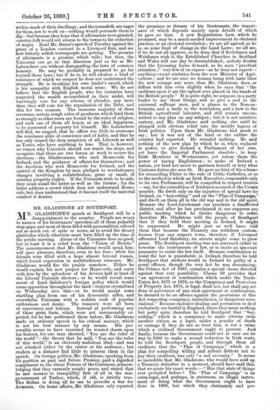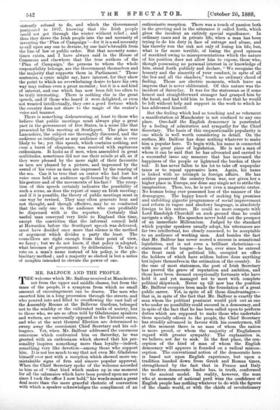MR. GLADSTONE AT SOUTHPORT.
MR. GLADSTONE'S speech at Southport will be a disappointment to the country. People are weary to nausea of his lieutenants' speeches, all of them palpably stop-gaps, and most of them filled with personalities, uttered not so much out of spite or scorn, as to avoid the dreary platitudes which otherwise must have filled up the time of the public meeting. Abuse of the Unionists does no good, but at least it is a relief from the " Union of Hearts." The announcement that Mr. Gladstone would speak him- self gave pleasure, therefore, even to his foes ; while his friends were filled with a hope almost beyond reason, which found expression in multitudinous rumours. Mr. Gladstone would fire the prairie somehow. Either he would explain his new project for Home-rule, and carry with him by the splendour of his devices half at least of the Liberal Unionist electors ; or he would reveal some secret of Lord Salisbury's foreign policy which would rouse opposition throughout the land—rumour crystallised on Wednesday into this—or he would accept some startling plan from one of his democratic aides, and overwhelm Unionism with a sudden rush of popular enthusiasm and desire. The rumours were all born of expectancy and tedium. Instead of performing any of these great feats, which were not unreasonably ex- pected, for he has performed them before, Mr. Gladstone made an ordinary speech in his critical manner, which is not his best manner by any means. His per- sonality seems to have exercised its wonted charm upon his hearers, for one man shouted, " You are the ruler of the world "—the theory that he said, " You are the ruler of this world," is an obviously malicious libel—and was not rebuked either by the orator or his audience ; but readers at a distance find little to interest them in the speech. On foreign politics, Mr. Gladstone, speaking from his position as past and future Premier, paid a dignified compliment to the Great Powers of the Continent, acknow- ledging that they earnestly sought peace, and stated that he saw menace to tranquillity first of all in the mis- government of Turkey, which, if old, is strictly true. The Sultan is doing all he can to provoke a war for Armenia. On home affairs, Mr. Gladstone only repeated the promises or threats of his lieutenants, the import- ance of which depends mainly upon details of which he gave no hint. A new Registration Law, which he promised, may he a much-needed improvement in electoral practice, or an electoral revolution ; we are all agreed, as he is, on some kind of changein the Land Laws ; we all see, if we do not all approve, as he does, that if Scotchmen and Welshmen wish it, the Established Churches in Scotland and Wales will one day be disestablished ; nobody doubts that the Licensing Laws demand, as he says, "practical attention ;" very few of us expect—as he does not expect— anything except statistics from the new Ministry of Agri- culture ; and we are sure no human being with taste likes the new coinage any more than Mr. Gladstone does, or differs with him even slightly when he says that " the emblems upon it are the ugliest ever placed in the hands of the British people." It is quite right, we suppose, in a party leader to say those things, and so give a nod to the universal suffrage men, and a glance to the Noncon- formists, and a smile to the teetotalers, and a bow to the British agricultural labourer, and still remain uncom- mitted to any plan on any subject ; but it is not nutritive oratory, and Mr. Gladstone said nothing else until he plunged with obvious relief into the muddy lagoon of Irish politics. Upon them Mr. Gladstone had much to say ; but it was not of the kind or the calibre the country had expected. He revealed nothing. He said nothing of the new plan by which he is, when replaced in power, to give Ireland a Parliament of her own, yet leave the Imperial Parliament absolute ; to keep Irish Members in Westminster, yet refuse them the power of taxing Englishmen ; to make of Ireland a nation, yet bind her never to garrison herself or levy what Customs duties she sees fit. He gave no hint of his scheme for reconciling Ulster to the rule of Celtic Catholics,, or as to the method in which an Irish Executive, responsible only to its own Parliament, will be compelled to respect treaties —say, for the extradition of Irishmen accused of the Cronin murder. He dwelt only on the injustice of special laws for Ireland, on " boycotting " and on the "Plan of Campaign," and dwelt on them all in the old way and in the old spirit. Because the Lord-Lieutenant can proclaim a disaffected district, and after he has proclaimed it, can suppress any public meeting which he thinks dangerous to order, therefore Mr. Gladstone told the people of Southport i that if they held their meeting in Ireland, it might be suppressed. He might just as well have told them that because the Treasury can withdraw custom- houses from any seaport town, therefore if Liverpool affronted Lord Salisbury, its streets might come to grow grass. The Southport meeting was not convened either to terrorise the. instruments of law, or to incite an ignorant peasantry to resist the law itself. Because combination to resist the law is punishable in Ireland, therefore he told Southport that strikers would in Ireland be guilty of a penal offence, though the very Act he was denouncing, the Crimes Act of 1887, contains a special clause directed against that very possibility. Clause 18 provides that " an agreement or combination which under the Trade- Union Act, 1871 or 1876, or the Conspiracy and Protection of Property Act, 1875, is legal, shall not, nor shall any act done in pursuance of any such agreement or combination, be deemed to be an offence against the provisions of this Act respecting conspiracy, intimidation, or dangerous asso- ciations." Because exclusive dealing and persuasion to deal exclusively are lawful in England, where they mean nothing but petty spite, therefore he told Southport that " boy- cotting,' which is a conspiracy to make citizens treat another citizen as a leper, under a penalty of death or outrage if they do not so treat him, is not a crime which a civilised Government ought to prevent. And finally, because the Government could not at once see its way in 1886 to make a second reduction in Irish rents, he told the Southport people, and through them all creditors, that the " Plan of Campaign," which is a plan for compelling willing and solvent debtors not to pay their creditors, was only " a sad necessity." It seems so incredible that Mr. Gladstone, who would have sold up a Treasury defaulter in a moment, should have said this, that we quote his exact words :—" Has that state of things ever prevailed before ? The Plan of Campaign' is an extra-legal, and perhaps, in strictness, an illegal instru- ment of doing what the Government ought to have done in 1886, but which they obstinately and per- sistently refused to do, and which the Government postponed to 1887, knowing that the Irish people could not get through the winter without relief ; and thus they drove the Irish people into the sad necessity of inventing the Plan of Campaign '—for it is a sad necessity to call upon any one to deviate. by. one hair's-breadth from the line of law or public order. But that necessity some- times exists, and I have always said in the House of Commons and elsewhere that the true authors of the Plan of Campaign,' the persons to whom the whole responsibility belongs, are the Government themselves and the majority that supports them in Parliament." Those sentences, a cynic might say, have interest, for they show the point to which an overwhelming desire to have his own way may reduce even a great moralist ; but it is a sad kind of interest, and one which has now been felt too often to be truly interesting. There is nothing else in the great speech, and if those who heard it were delighted, or even not wearied intellectually, they owe a good fortune which the country does not share to the magic of the orator's voice and manner.
There is something disheartening, at least to those who believe that public meetings must always play a great part in the government of free States, in a scene like that presented by this meeting at Southport. The place was Lancashire, the subject one thoroughly discussed, and the audience as intelligent as any audience of the size is ever likely to be ; yet this speech, which contains nothing, not even a burst of eloquence, was received with rapturous enthusiasm. It looks as if men, when assembled in great multitudes, sometimes did not use their minds at all, as if they were pleased by the mere sight of their favourite as men are pleased by a picture, and impressed by the sound of his voice as men are impressed by the roaring of the sea. Can it be true that an orator who had lost his voice once held an audience spell-bound by the charm of his gesture and of the movements of his face ? The recep- tion of this speech certainly indicates the possibility of such a scene, as does the report of many an Irish meeting ; and if it is possible, the theory of public meetings must in one way be revised. They may often generate heat and not thought, and though effective, may be so conducted that the only one in the audience who can profitably be dispensed with is the reporter. Certainly that useful man conveyed very little to -England this time, except the conviction that the informal council held at Hawarden before the Southport speech was delivered, must have decided once more that silence is the method of argument which divides a party the least. The councillors are right enough from their point of view, we-fancy ; but we do not know, if that policy is adopted, what becomes of government by deliberation. To take a vote on a man's name instead of his policy, is the ple- biscitary method ; and a majority so elected is but a series of noughts intended to elevate the power of one.







































 Previous page
Previous page